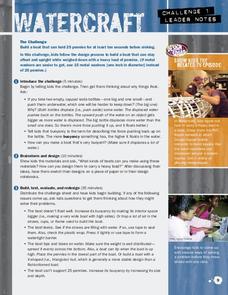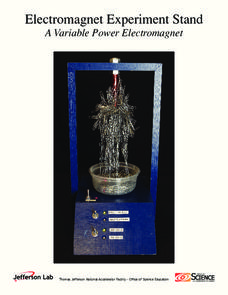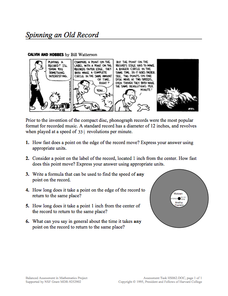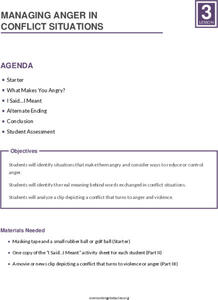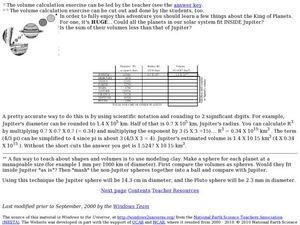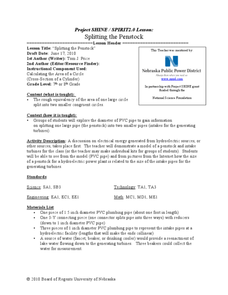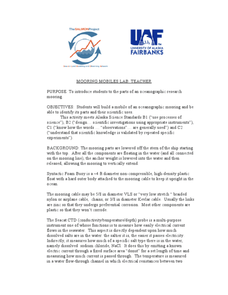DiscoverE
Slinky® Science
Toys are great for learning about physics. Scholars use Slinky® toys to study Newton's laws of motion and types of energy. After a little play, they then model longitudinal and transverse waves with the Slinky® toys.
DiscoverE
Kinetic Sculpture
Let your creativity run wild. Scholars build a sculpture out of basic materials. These sculptures must be able to move in the wind (from an electric fan). However, they must also withstand the wind enough to not fall over—it's quite the...
DiscoverE
A Clever Way to Water
Your plants will survive without you. Scholars create a device that can water plants using a coiled string. Along the way, they learn about adhesion and cohesion of water. The challenge is to keep the plants alive for at least a week.
PBS
Watercraft
Whatever floats your boat—with some additional weight. The first activity in a five-part series challenges pupils to design a boat to hold pennies. Using the design process, learners design, build, and test their boats, making sure they...
PBS
Paper Table
What is black and white and re(a)d all over? Class members build a table out of rolled newspapers. Pupils follow the design process to design, build, and test their paper tables in the second challenge in a series of five.
Nuffield Foundation
Investigating the Effect of Concentration of Blackcurrant Squash on Osmosis in Chipped Potatoes
Model and explore osmosis using squash and potatoes. Young scientists expose chunks of potatoes to different concentrations of a squash solution. They compare the weights of the chunks before and after exposure to the solution and use...
101 Questions
2010 Guatemalan Sinkhole
Dig deep into a lesson studying volume. Learners view images of a Guatemalan sinkhole that seems too big to be true! Their task is to determine the amount of material needed to fill the hole using information from news articles and videos.
101 Questions
You Pour, I Choose
Tall and skinny or short and stout, which glass hold the most liquid? Learners analyze dimensions of cylindrical glasses to determine the one holding the greatest amount of liquid. They brainstorm the relevant dimensions before making...
US Department of Energy
Electromagnet Experiment Stand: A Variable Power Electromagnet
Electromagnets come in both large and small scales—from big machinery in scrap yards to hard disk drives. Here's a resource that provides directions for building a variable electromagnet on a stand. Scholars then experiment with the...
US Department of Energy
The Invisible Electromagnet: A Transparent Magnetic Field Viewer
Audio speakers, hard drives, credit cards, and even the earth use magnetic fields. While we observe the effect of magnetic fields, we can't actually see them. A viewer helps participants explore magnetic fields, some of the items that...
Serendip
Diffusion and Cell Size and Shape
Is your class ready to size up the topic of diffusion? Help them get cell shape savvy with a well-written handout. The resource covers how substances such as oxygen passively move through the cell membrane and how cell size and shape...
CCSS Math Activities
Out of the Swimming Pool
Out of the swimming pool and into the math classroom! Young mathematicians analyze two linear functions representing the number of liters of water in a pool as it drains over time. They must evaluate functions, interpret function...
CCSS Math Activities
Ferris Wheel
Wheel the resource right into your classroom. Young mathematicians use given dimensions of a Ferris wheel to write a height versus time function. They use their functions to answer a set of questions about the Ferris wheel.
Mascil Project
The Pipe Clamp
Clamp onto the resource and don't let go. Future mechanical engineers produce a pipe clamp from a sheet of metal. This idea is to use the pipe clamp to affix a pull-up bar in a doorway.
Concord Consortium
Spinning an Old Record
Take a trip back in time to examine angular velocity. Using the revolutions per minute, learners calculate the speed of a point on a 33 record. They compare the speed of a point on the edge of the record to the speed of a point closer to...
American Museum of Natural History
Light Quest
Grab a partner and shed some light on light. A remote learning resource has scholars play a board game to answer trivia questions about light. They also read about how Einstein contributed to the understanding of light as both a wave and...
Overcoming Obstacles
Managing Anger in Conflict Situations
The third lesson in the "Conflict Resolution Module" teaches participants strategies to reduce or control their anger. Class members first list situations that make them angry and then brainstorm a list of techniques that can lessen or...
Curated OER
Volume Calculation Exercise
Middle schoolers work with scientific notation and rounding as they determine volume. In this volume lesson, pupils attempt to calculate the volume of the planet Jupiter. They use rounding to two significant digits and scientific...
Curated OER
Cylinder Volume Lesson Plan
Tenth graders define the formula for cylinders and use it to solve real world problems. In this geometry lesson, pupils differentiate between area, perimeters, 2D shapes, 3D shapes, and volume of prisms, cylinders and spheres. They...
Curated OER
Splitting the Penstock
Students investigate the best way to calculate the measurements of an area. In this geometry lesson, students relate a large circle to a cylinder and its measurements. They use PVC pipes to gain hands on experience as they calculate the...
Mr. E. Science
Stars, Galaxies and the Universe
It takes 225 million years for our sun to travel around the galaxy. The presentation covers astronomical units, light years, telescopes, types of stars, the life cycle of a star, and types of galaxies. This is the last lesson in a...
Curated OER
Mooring Mobiles Lab
Oceanography experts use candy to construct a model of a bio-physical mooring that would test a variety of factors. Each piece of equipment to be included on the mooring is described within the write-up. As pupils gather the candies for...
Curated OER
Paper Coil Baskets
Have your class learn about basket making with this resource. Learners talk about the techniques used to make baskets in Native American cultures. Then, they make baskets using paper coils. The results are attractive.
Curated OER
The Irrational Numbers
In this algebra activity, students solve rational numbers using addition, subtraction and multiplication. They identify the rules of solving rational and irrational numbers. There are 50 questions on 6 pages.
Other popular searches
- Circumference and Diameter
- Radius and Diameter
- Circumference Diameter
- Radius Diameter
- Circles/circumference/diameter
- Diameter of a Sphere
- Diameter of a Circle
- Pi and Diameter
- Diameter, Radius and Chord
- Diameter Limit Cut
- Radius & Diameter
- Radius, Diameter





